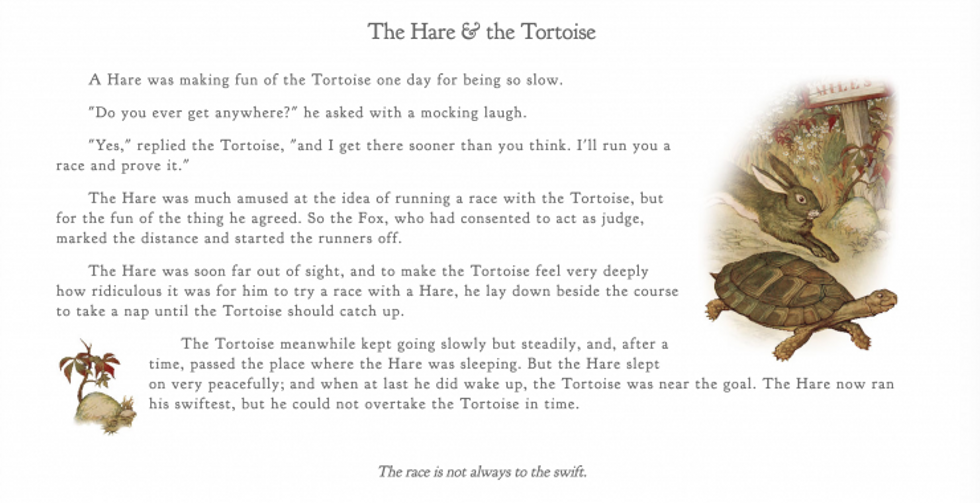What the Tortoise and the Hare Can Teach You About Your Filmmaking Career
Slow and steady wins the race.

'Looney Tunes'
I have always been a real fan of Aesop's fables. I think they're excellent stories for kids that teach valuable lessons, but I also think they're excellent places to go back to when you're an adult. Not only are they free intellectual property you can adapt, but I think they really carry a lot of metaphors that translate well to the film and television business.
Maybe the most important one is the story of the tortoise and the hare.
I think it has to be the most famous of Aesop's fables, with the boy who cried "wolf" coming in a close second.
Today I wanted to refresh your memory on the allegory and go over why it matters so much when looking at your career as a filmmaker.
Let's dive in.
The Tortoise and the Hare Allegory
For those of you who may never have learned this story, I posted an image from a free children's fable book below. But here is a refresher for the audience.
It's the story of a turtle who lives in the forest and has a quiet and humble life. There's a rabbit, or hare, who lives in the same forest who does everything fast. The rabbit boasts and boasts that he can beat anyone in the forest to a race. One day, getting tired of the rabbit's boasts, the tortoise claims he can get somewhere faster than the rabbit.
They decide to race. When they begin the route, the rabbit jumps out to an early lead, but his lead is so large that he keeps getting distracted. Eventually, the rabbit sits down and takes a nap. The turtle, who is never off course, catches up to the rabbit, passes him, and wins the race.
The rabbit wakes up and realizes he's lost because, while being fast, he was lazy and easily distracted.
The turtle wins not because he was the fastest, but because he paced himself and never took his eyes off the prize.
The moral? Slow and steady wins the race.

The Tortoise and the Hare for Filmmakers
I have written about the rejection you find in Hollywood before, but with every pass on a script or project that falls apart, I think there's got to be a refocusing. I got some frustrating news earlier, and rather than tweet about it or throw a tantrum, I am reading Aesop's fables.
Why?
Because in screenwriting, directing, producing, and all the other nuanced jobs within film and television, one maxim holds true...
Slow and steady wins the race.
Now, I cannot promise you that this business is a meritocracy. Or that you will become Steven Spielberg if you just keep going, but I do think there is a degree of stubbornness mixed with the ability to learn and soldier on that gets you much farther in Hollywood than you think.
See, we often hear about the wunderkinds who are hot right out of the gate. The people who have famous parents or sell a bunch of scripts overnight, or the indie darling who jumps right into directing a well-known studio franchise.
But the fact of the matter is, most people working in Hollywood are just workers. People who took the tortoise's route to success.
They kept their heads down, they weathered the storms, and they just kept right on working until they crossed the finish line.
As the saying goes, Hollywood is not a sprint, it is a marathon. I know lots of people who start out hot and then fade away. I think I have talked about it here before, but my original managers and agents are no longer in the biz. I somehow outlasted them, as amazing as it might seem.
And even with new reps and projects that excite me, I'm still just plugging away, following the path to success. I am doing this because I know in Hollywood there is no definitive finish line.
In Hollywood, you are always on the tortoise's journey. If you try to be a hare, you burn out quickly. Instead, the writer and director and producer way of life is just to keep pushing, over and over, even when there's a hill, sleet, snow, fire, coronavirus, and everything that comes with it. There is not one line you cross that makes you successful forever.
There is just a marathon you run and run and run.
And I hope any of these posts help you along the way.
What's next? Get our free screenwriting eBook!
So much of what we're talking about on No Film School when it comes to screenwriting is summarized in our new eBook. It also helps guide you through a 10-week writing plan that will get your script actually finished.
















